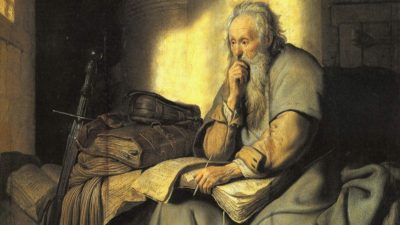Second Sunday of Advent
December 5, 2021 — Year C
Readings: Bar 5:1-9 / Ps 126 / Phil 1:4-6, 8-11 / Lk 3:1-6
by Rev. Nixon Negparanon, Pastor
The season of Advent is a time for us to prepare our hearts for Christmas. In our gospel today, on this second Sunday of Advent, we hear John the Baptist preparing the people for the coming of Jesus, a voice of one crying out in the wilderness, “Prepare the way of the Lord. Make his path straight.” (Lk 3:4). We hear these familiar words of John the Baptist calling all people to conversion.
Saint Paul’s letter to the Philippians in our second reading today, reminds us of three wonderful things. First, Saint Paul reminds us of the joy of the Lord.
Christmas is only three weeks away. Most people prefer not to work on Christmas. No one wants to spend Christmas in the workplace. Even sick people prefer not to spend Christmas in the hospital, if at all possible, much less in jail. Christmas is a time of joy, and there is no joy in a hospital bed or jail cell.
And yet, Saint Paul, in our second reading today, is writing his most cheerful letter to the Philippians from a prison cell. Paul was in detention in Rome while awaiting his trial. Neither the uncomfortable condition in the prison cell, nor the uncertainty of the outcome of the trial was enough to rob Paul of his cheerful and joyful disposition.
What was the secret of Paul’s unflagging optimism? No doubt, it was his great faith in God. This faith expresses itself in two important attitudes: an attitude of gratitude in regard to the past and an attitude of confidence in regard to the future. This was the key to Paul’s cheerfulness, even in the face of his present predicament.
We often talk about the value of living in the present, but what do we mean by the present? Is it this year, this week, this day, or this minute? The fact of the matter is that the present is a fleeting split second, such that before we get to think of or mention it, it has already passed into the past. We cannot freeze the present in order to live in it, because the present is always passing us by.
Maybe it is better to think of the present as the meeting point between the past and the future. Then we shall begin to realize that the way to seize the moment and discover happiness in the present, is to cultivate a positive attitude toward the past and toward the future.
In his letter to the Philippians, Paul did not focus on the present chains of his imprisonment, but on the happy memories of his relationship with the Philippians, and on the glorious future of the day of the Lord. This might explain why this letter is the most joyful of all his letters. The opening section of the letter, which we have heard in today’s second reading, illustrates the secret to Paul’s positive mindset.
Second, Saint Paul reminds us to have gratitude for the past. In verses 3-5 in our second reading, Paul says, “I thank my God every time I remember you, constantly praying with joy in every one of my prayers for all of you because of your sharing in the Gospel from the first day until now.”
Even though Paul now finds himself in very unpleasant circumstances, he chooses to begin his letter with a note of gratitude for the past. The Philippians had contributed generously in his ministry of spreading the Gospel. They were not just children of God, or his spiritual children, but his partners in ministry. For this, Paul thanks God and prays constantly with joy for them. An attitude of gratitude for the past puts a smile on our faces, no matter what we may be going through today.
Third, Saint Paul reminds us to have confidence in the future. In verse 6 of the second reading, Paul says, “I am confident of this: that the One who began a good work among you, will bring it to completion by the day of Jesus Christ.” Paul looks to the future with confidence. His confidence is anchored, not in the faithfulness of the Philippians, but in the faithfulness of God. God is faithful. God, who began a good work in the church of Philippi will bring it to a glorious completion.
Many people think of the last day and the last judgement with fear and anxiety. Paul thinks of it with confident expectation, as the day when God will bring to completion the good work of faith that He is doing among us. The present is nothing but the meeting point of the past and the future. If, like Paul, we cultivate the attitude of looking to the past with gratitude and to the future with confidence, then we shall know the joy of the Lord. This is the inner joy which made the early Christians sing, even as they were being marched to death by their persecutors.
One such example is Cyprian, the Bishop of Carthage, who, as he was facing death in the year 258, wrote the following words to his friend, Donatus. He said, “It is really a bad world, Donatus, an incredibly bad world. Yet in the midst of it I have found a quiet and holy people. They have discovered a joy which is a thousand times better than any pleasure of this sinful life. They are despised and persecuted, but they care not. These people, Donatus, are Christians, and I am one of them.”
The joy of the Lord was the strength of the martyrs. May the same joy of the Lord be our strength today as we face the challenges of witnessing to the goodness of the Lord, even in our very challenging and struggling world.
 540-586-8988
540-586-8988 

